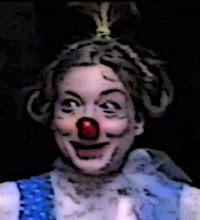Moubalara!
From the first moment, I was so impressed and so excited to work with these students -- they were really talented, expressive and 100% gung-ho. It is immensely satisfying to teach students who are hungry to learn and who appreciate everything you give them – and who give you all the more in return. Over the course of 10 days, we worked intensively together, all of us greatly invested in the creative process and each other.
Now, imagine having only 10 days to train and create a show with a cast of 34 people! We had before us a Herculean task. Add to the challenge the fact that we were not producing an already written play. Our play was an original ensemble creation. This means we draw the material out of the group, developing it and shaping it together. The process was helped greatly by the fact that the students were so creative and so willing to play. My mantra for the workshop became: Koulakoum moubalara! Everybody is amazing! In the end what emerged was a powerful and poignant piece -- not fully developed nor professionally seamless -- but nonetheless a compelling performance, about 40 minutes long.
This is not to say that there weren't bumps along the way.
 |
| Movement exercise |
I don’t think I’ve ever done that before, quite so intensely. But I was so passionately invested in their performance, because I knew how much it mattered to them to get to perform and have their say. I had seen their potential and knew how great they could be. The students told me, "We will give our all on performance night." I countered: "Yes, but to get there you must do it now in rehearsal. You must cultivate your performance with 100% engagement from the start!" This was our last rehearsal, there was a lot of tension built up, and the whole session culminated in a declaration of commitment, passion and love for our work together and each other. In ten intense days, we had created a really strong bond. We were working hard on something already complex and challenging -- and to this was added an underlying sense of urgency. Our endeavor was becoming increasingly controversial.
The Great Challenge
We were creating a performance piece on a social issue. Initially, the theme suggested by the YES Academy producer was national identity (in the wake of separation from South Sudan), but Lydia and I left the question open-ended. We asked our students: We are here to create a show on a social issue relevant to you. What do you want to talk about? What is important to you? We wanted to hear from the students their own thoughts and ideas. And they had a lot to share.
From among all the topics of discussion, what emerged as the main issues were:
 |
| Voting on the theme |
- Unemployment – no work for young graduates
- Cultural identity – are we Arab or African?
- Acceptance of the arts – society does not accept creativity and innovation
and most fervently, - Freedom of expression.
They yearn to speak their minds as artists, to express their passions and points of view. These were all issues our students felt strongly about and that they feel are of great relevance to the Sudanese people. It was interesting to learn about the cultural confusion. Indeed, it’s a real identity crisis for many. Ethnically the majority of Sudanese are African but culturally the majority are Arab (in North Sudan). Some look very Arabic (Middle Eastern), but most look African (black) or a mix. All speak Arabic and are mainly Muslim. There’s great tension between the two, and African-looking Sudanese often feel discriminated against.
But the most burning issue among the students was freedom of expression.
And here was our great challenge: how create a show in which the students can speak out on what matters most to them – social justice, economic opportunity, spiritual fulfillment, freedom to express -- without criticizing the government? I was tasked with doing social theater but under no circumstances to criticize the regime! Bringing up any social issue can be viewed as criticism. The last thing I want to do is stifle my students. But I also don’t want negative consequences!









No comments:
Post a Comment